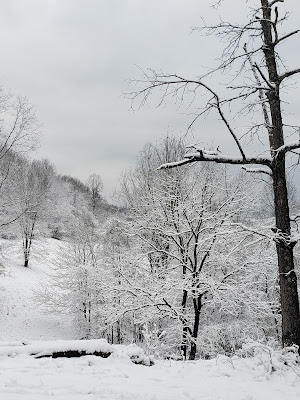Cold, blustery, snowy day yesterday, and temps dropped overnight to 24°f. Brrr. 3" accumulation, but it didn't stick to roads or wet areas. So pretty.
I love Christmas music. I start listening to it right after Thanksgiving and reluctantly put the recordings away at New Year’s. I was surprised to learn, however, that quite a few songs of this holiday season originated or were adapted in our Appalachian mountains. Some are original pieces, others are adaptations of British and Welsh carols that traveled across the ocean with the early settlers. I often sang these and told their history at my Christmas storytelling presentations. What fun those days were! Although honestly, I am glad to have my December free of the pressure, stress and travel of those days. (I've included a few pics of yesterday's snow, just to liven up all the text.)
One of the most famous Appalachian carols is probably I Wonder as I Wander with its soaring, haunting melody that seems to hold the echo of the mountains. Collected by opera singer and song catcher John Jacob Niles in Murphy, North Carolina in the 1930s, the simple lyrics convey the wonder of a child at story of the birth of Jesus. Niles said that he heard the song, just a couple lines actually, from a young missionary girl named Annie Morgan. He paid her to sing it over and over until he memorized it. Niles probably added some verses himself, and perhaps added some melody lines as well to make a complete song. It remains one of the most touching of the carols sung today. The link takes you to a version by Linda Ronstadt, just impossibly beautiful.
Most people know that Frosty the Snowman was written by Jack Rollins of Keyser, West Virginia. What is not as well known is that Rollins was the breadwinner for his family at a very early age, delivering newspapers and selling magazine subscriptions after his mother went blind from glaucoma. He worked at a variety of jobs, from glassmaking to baggage handler at Penn station in New York, but he eventually quit work to write songs full-time. His first success was Here Comes Peter Cottontail, followed the next year by Frosty. Jimmy Durante sings my linked version, such a classic!
The Cherry Tree Carol is actually an old British ballad that found a new home in the mountains. The words changed slightly, as did the melody. In this carol, Joseph gets angry when Mary asks him to pick some cherries for her, and he suggests that she ask the father of her baby to gather the cherries. The baby Jesus in her womb then tells the tree to bend down so Mary can pick the cherries herself, and Joseph just stands around watching. I can imagine how dumbfounded he was! The tune is light and cheerful, and certainly makes Joseph very human in his anger and perplexity. Judy Collins sings the linked version of this very old song.
Beautiful Star of Bethlehem was written in a milk barn by a Tennessee farmer named R. Franklin Boyce, the father of eleven children. In such a household it was difficult to find a quiet space to write, so Mr. Boyce would take his pen and paper to the barn. “The words and melody got on my mind,” Boyce once told a reporter, “ till I could hardly sleep at night.” Boyce and his family never collected any royalties for this song, as the practice of those days was for the songwriter to be paid a one-time fee by the publishing company which then owned the rights to the song. Doesn’t seem fair, does it? But his song lives on and continues to brighten the holidays for people around the world. Perhaps that is the best compensation a songwriter could ask for. The Judds sing this carol the very best, in my opinion. Take a listen and see what you think.
One more: Deck the Halls! According to some researchers, it is believed that this popular song was brought to the Appalachian mountains of North Carolina by Welsh miners. The song was sort of a pass-around song, where one person would sing a line and the next would have to make up a line quickly that rhymed. And if they couldn't, they would just sing falalalala. Eventually the song morphed into the version we know today. True? Or just folklore? No one has been able to prove this story either way. Sung here by Bing Crosby and Frank Sinatra.






No comments:
Post a Comment
Thank you for sharing your thoughts! Comments are moderated so may not appear immediately, but be assured that I read and enjoy each and every word you write, and will post them as quickly as possible.